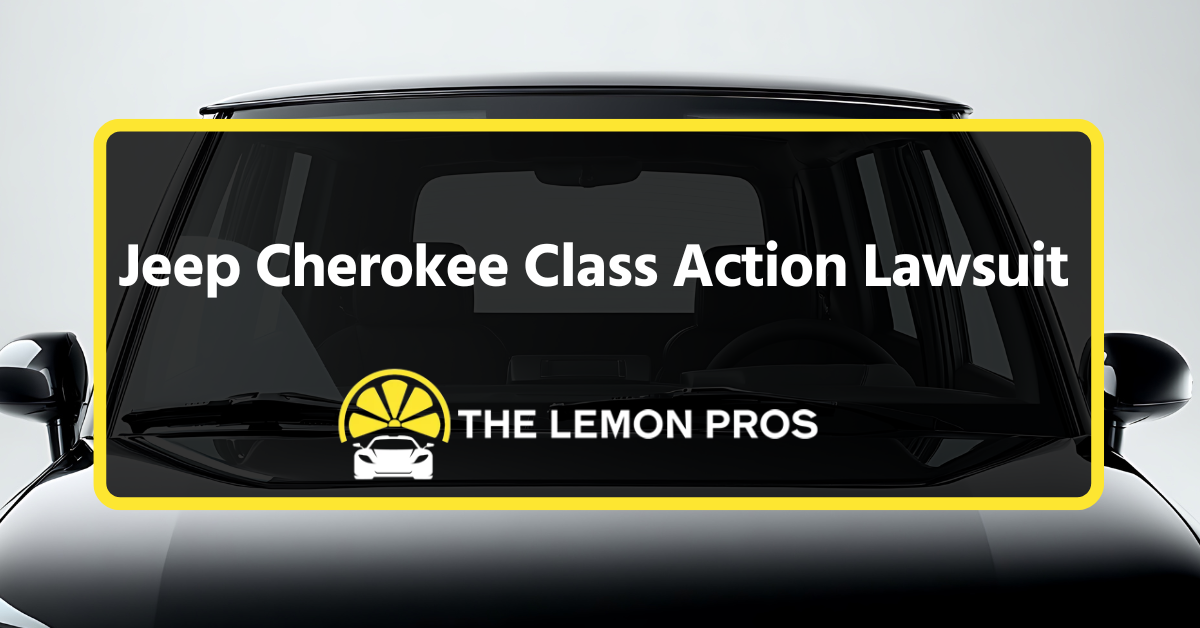
Jeep Cherokee Class Action Lawsuit
If you’ve heard about the Jeep Cherokee class action lawsuit, you may be wondering whether your SUV could be part of it. With thousands of Jeep owners reporting similar issues, there have been growing concerns and legal action taken over the past decade.
At The Lemon Pros, we combine our legal experience with tangible results for frustrated Jeep owners. Our practice areas focus on helping drivers with a defective vehicle get the compensation they deserve. Schedule a free consultation today to find out where you stand.
In this article, we break down what the Jeep class action lawsuit is about, which models have been affected, and the steps to take if your vehicle has the same issues. You’ll also learn about the difference between joining a class action suit and filing an individual lemon law claim.
Table Of Contents
- What Is the Jeep Cherokee Class Action Lawsuit About?
- Which Jeep Cherokee Defects Led to Lawsuits?
- Who Qualifies for the Jeep Cherokee Lawsuit?
- How to Join a Jeep Cherokee Class Action Lawsuit
- Is a Lemon Law Claim Better Than a Class Action Lawsuit?
- What Are the Latest Jeep Cherokee Lawsuit Updates?
- What Should Jeep Cherokee Owners Do Now?
- How Jeep and Stellantis Are Responding
- Will More Jeep Cherokee Class Actions Be Filed?
- Have a Defective Jeep Cherokee?
- FAQs About Jeep Cherokee Class Action Lawsuits
What Is the Jeep Cherokee Class Action Lawsuit About?

A class action lawsuit allows a group of Jeep Cherokee owners to take legal action together when they’ve experienced a similar vehicle defect or performance issue. This option gives drivers a stronger voice and helps to streamline claims that share core problems.
In the following cases, owners have voiced their concerns about Stellantis, previously known as Fiat Chrysler Automobiles or FCA. They've pointed out recurring issues with the performance, safety, and reliability of their vehicles. Many of the lawsuits claim that manufacturing or design flaws have led to repeated mechanical failures and unsafe driving conditions.
By combining the individual claims into class actions, affected Jeep Cherokee owners address widespread issues without as much hassle. Overall, the action helps to push for more accountability from the manufacturer.
Which Jeep Cherokee Defects Led to Lawsuits?
Over the years, Jeep Cherokee owners have reported a range of problems that raised serious reliability and safety concerns. These issues often go beyond normal wear and tear, leading to multiple lawsuits and class actions. Many of the claims focus on recurring mechanical or electrical defects that can impact performance, safety, and overall driver confidence.
Jeep Cherokee Transmission Class Action Lawsuit
Many 2014 and 2015 Jeep Cherokee owners reported problems with the ZF 9-speed automatic transmission. Complaints included harsh or delayed shifting, unexpected power loss, and complete transmission failure. These issues raised safety and reliability concerns, leading to a class action lawsuit against Stellantis.
As a result of the settlement, class members received an extended warranty. Those with multiple documented dealer complaints were also offered financial compensation or trade-in vouchers. To qualify, complaints had to be filed before the cutoff date, and the settlement is now closed.
Jeep Cherokee Engine Oil Consumption Lawsuit
Drivers of the 2014-2019 Jeep Cherokee or 2015-2018 Jeep Renegade equipped with the 2.4L Tigershark engine reported excessive oil consumption that led to engine stalling and failure. This defect prompted a class action lawsuit (Wood v. FCA US, LLC).
The settlement offered affected owners an extended powertrain warranty covering the repairs. Any owners who incurred out-of-pocket expenses for towing, rental cars, or repairs were also eligible for reimbursement. Anyone who received an engine replacement under Customer Service Notification W80 automatically earned a $340 cash payment. While the settlement had a claims deadline of March 1, 2023, affected owners may still be eligible for the extended warranty coverage.
Jeep Cherokee PTU Failure Class Action
The power transfer unit (PTU) is a necessary component in Jeep Cherokee models with all-wheel drive. It transfers power from the transmission to the rear axles, enabling power to all four wheels. In some 2019-2022 Jeep Cherokee models, there have been reported PTU failures, leading to a sudden loss of drive power and unintended vehicle rollaway.
Investigations into these failures are ongoing, with some owners reporting significant repair costs and vehicle downtime. In response, law firms have initiated investigations into potential class action lawsuits. While Stellantis has offered a recall for 2017-2019 Jeep Cherokee models due to PTU defects, it’s crucial to report any further issues to your local dealership, the National Highway Traffic Safety Administration (NHTSA), and a lemon law attorney to protect your rights.
Jeep Cherokee Forward Collision Warning Lawsuit
2021-2024 Jeep Cherokee and Grand Cherokee models have reported issues with the Forward Collision Warning (FCW) and Automatic Emergency Braking (AEB) system failing to activate. Drivers have experienced situations where the systems didn’t provide warnings or braking assistance during potential collisions, raising significant safety concerns.
Investigations are underway to determine if the defects warrant a class action lawsuit. Therefore, affected owners should report the problem to the dealership, the National Highway Traffic Safety Administration (NHTSA), and an experienced attorney. You may be eligible for compensation or repairs if a lawsuit is filed.
Jeep Cherokee Battery or Hybrid Defect Lawsuit
Owners of 2020-2024 Jeep Wrangler 4xe and 2022-2024 Jeep Grand Cherokee 4xe models have reported incidents of high-voltage battery fires, engine shutdowns, and recalls due to the defective battery components. These issues have prompted class action lawsuits alleging that Stellantis sold vehicles with faulty batteries that can catch on fire.
The lawsuit (Fishon v. Stellantis) was filed in March 2025 in the New York federal court. The plaintiff seeks damages for violations of state and federal consumer laws. If you own an affected model and have experienced battery-related issues, you need to report the problems to the dealership, the National Highway Traffic Safety Administration (NHTSA), and an experienced attorney. You may be eligible for compensation or repairs, depending on the outcome of the case.
Who Qualifies for the Jeep Cherokee Lawsuit?

The only active class action lawsuit available right now involves the 2020-2024 Jeep Wrangler 4xe and 2022-2024 Jeep Grand Cherokee 4xe with a high-voltage battery defect. Owners of affected models can take part in a lawsuit that seeks damages for breach of warranty, negligent misrepresentation, fraud, and unjust enrichment. Individuals with an affected class vehicle may be entitled to compensation if the case is certified.
However, further problems may turn into lawsuits with the Jeep Cherokee. For this reason, it’s critical to keep all of your receipts, service records, and recall notices with your vehicle. As soon as you experience problems, you want to contact the dealership and manufacturer. If the issue continues without remedy, you may need to consult with a lemon law attorney.
How to Join a Jeep Cherokee Class Action Lawsuit
Joining a class action lawsuit may appear complicated, but these steps can make the process a lot simpler.
Step 1: Find the Official Class Action Website
Begin by locating the official class action site for your specific lawsuit. Official sites may be linked through the NHTSA or the law firm handling the case. If you are unsure where to turn, speak to your lawyer, who will help you find the legitimate source, so you can avoid scams.
Step 2: Submit a Claim Form
On the official website, fill out the claim form carefully. Remember to include the following information:
- Vehicle information (VIN, model year, trim, etc.)
- Repair records, service receipts, or recall notices
- Any out-of-pocket expenses related to the defect
- Your contact information (address, email, phone number)
Submit the form by the deadline listed on the site. Missing the deadline can disqualify you from monetary compensation.
Step 3: Monitor Settlement Status and Payout Updates
After you submit the claim, check the website often for updates. You can also sign up for email updates, which keep you informed about the settlement approval status, estimated payout timelines, and any additional document requests.
If you prefer to pursue an individual lawsuit instead of being bound by the class settlement, you must submit an opt-out request before the deadline. Before doing this, make sure you speak with a qualified lawyer about the case.
Is a Lemon Law Claim Better Than a Class Action Lawsuit?

When your Jeep Cherokee experiences significant defects, such as transmission failures, engine issues, or safety system malfunctions, you have two primary legal avenues: filing an individual Lemon Law claim or joining a class action lawsuit. Each option has distinct advantages and considerations.
Consumers have access to a federal law known as the Magnuson Moss Warranty Act. There are also some state-specific lemon laws, such as the Song Beverly Consumer Warranty Act in California.
Through local legislation, you may be able to receive higher compensation, such as a full refund, vehicle replacement, or substantial cash payout. There’s usually a faster resolution than dealing with a class action lawsuit, and you may not need to pay any out-of-pocket legal fees to start a lemon law claim.
However, not all states have lemon laws, and others are very strict with the requirements. You will also need detailed documentation of the issues to qualify for lemon laws.
On the other hand, class action lawsuits address widespread issues, so the groundwork has already been laid for you. You also won’t have to worry about massive legal expenses, since they are shared among the class members. The major considerations to keep in mind are that you will get lower individual compensation since the payments are divided among members, and the process can be slower. You also won’t have a lot of control over the legal strategy or settlement decisions.
What Are the Latest Jeep Cherokee Lawsuit Updates?
As far as the FCW system, investigations are still ongoing, and no class action lawsuit has been filed yet. If your Jeep is facing similar issues, now would be the time to report them.
With the 4xe hybrid battery complaints, the class action lawsuit is now active. There are ongoing legal proceedings that you want to keep up with.
What Should Jeep Cherokee Owners Do Now?
If you own a Jeep Cherokee, start by checking for any active recallsor warranty extensions. You can do this through your dealership or the NHTSA recall database to ensure your vehicle is up to date on safety fixes.
Keep all repair and service documentation for any issues related to defects, including receipts, repair orders, and recall notices. These records are essential for potential claims, whether through a class action or an individual legal case.
Consider contacting a consumer law attorney who specializes in automotive defects. They can evaluate your situation, help determine eligibility, and guide you on the next steps. If there’s an active class action investigation in progress, you want to fill out any investigation forms necessary for the case.
How Jeep and Stellantis Are Responding
There have been several recalls and bulletins issued related to the problems being discussed. Here are a few to keep in mind:
- In early 2025, Stellantis announced a recall affecting more than 63,000 Jeep Cherokee vehicles with defective PTU units.
- In September 2025, Stellantis recalled more than 91,000 Jeep Grand Cherokee plug-in hybrid SUVs to repair a software defect in the hybrid control processor.
- Jeep has issued another recall for 2020-2024 Jeep Wrangler 4xe and 2022-2024 Jeep Grand Cherokee 4xe models due to the defective high-voltage batteries that may catch on fire. Drivers are ordered to park their SUVs outside until the problem is repaired.
- There have also been several TSBs for the 2025 Jeep Grand Cherokee, addressing major problems, such as suspension malfunctions, engine cooling issues, and faulty electrical systems.
Stellantis is also rolling out over-the-air (OTA) updates to enhance some Uconnect infotainment systems. However, a recent update did cause further functionality issues, leaving some vehicles inoperable. Stellantis halted the update and has issued a fix.
Will More Jeep Cherokee Class Actions Be Filed?

It’s likely. As newer Jeep Cherokee and Grand Cherokee models face ongoing hybrid, software, and safety concerns, additional class action lawsuits could emerge in 2025 and beyond. Past settlements, like the Tigershark engine and transmission cases, only cover certain years and defects, so they don’t prevent new claims tied to different issues or newer vehicles.
Owners should keep an eye on NHTSA investigations, recall notices, and class action websites for updates. If new problems arise, save all repair records and consider contacting a consumer law attorney to stay eligible for future claims.
Have a Defective Jeep Cherokee?
If your Jeep Cherokee has problems like engine failure, transmission issues, or hybrid battery defects, you could qualify for compensation. Some lawsuits are still open, but deadlines are approaching fast.
At The Lemon Pros, you can connect with our law attorneys for personalized guidance and a Free Case Evaluation. Our experienced team will review your situation, explain your rights, and help you take the fastest route toward resolution, allowing you to move forward with confidence. Contact us today.
FAQs About Jeep Cherokee Class Action Lawsuits
If you own a Jeep Cherokee, you may have questions about class action lawsuits, recalls, and potential compensation. We have the answers you are looking for, dealing with the most common concerns from Cherokee drivers.
How to Join a Class Action Lawsuit Against Jeep?
Find the official class action website related to your lawsuit. Fill out the claim form with your vehicle model, repair records, and contact information. Submit it by the stated deadline to ensure your eligibility.
What Is the Average Payout for a Class Action Lawsuit?
Average payouts depend on the defect, the number of claimants, and the settlement terms. Overall, class action settlements provide smaller amounts than individual lemon law claims. For example, in the FCA Tigershark engine settlement, affected owners received up to $340 if their vehicle needed an engine replacement due to oil consumption issues.
Which Jeep Cherokees Are Being Recalled?
Recalls affect several model years, including the 2014 and 2015 Jeep Cherokee for transmission issues and the 2014-2019 Cherokee with the 2.4L Tigershark engines. There have also been settlements for the 2017-2019 Cherokee PTU failures and potential claims for 2020-2024 Grand Cherokee 4xe models.
What Are the Worst Years for the Jeep Cherokee to Avoid?
The 2014–2015 models are frequently reported for transmission issues. The 2014–2019 models with the Tigershark engine are noted for excessive oil consumption. The 2022–2026 Jeep Grand Cherokee 4xe hybrids have been recalled for software defects.
Can I Get a Cash Payment for My Defective Jeep?
Yes, if your defective car was purchased or leased but has significant defects that can’t be repaired, you may be able to get a substantial cash payment. You can file a lemon law complaint with your qualifying vehicle to get a refund, replacement vehicle, or cash settlement.






